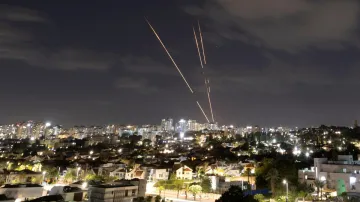Biden, G7 countries discuss imposing new sanctions on Iran following missile attack on Israel | LATEST
Biden unequivocally condemned Iran's attack on Israel at the G7 meeting called by Italian PM Giorgia Meloni and said there would be new sanctions on Tehran. Israel and Iran traded warnings at the UN Security Council on Wednesday as the region appeared close to an all-out war.

Washington: US President Joe Biden and other members of the G7 discussed new sanctions to be imposed on Iran following its massive missile attack on Israel in retaliation for Israel's campaign against Tehran's Hezbollah allies in Lebanon. This discussion took place as Italian Prime Minister Giorgia Meloni hosted a G7 leaders' call on Wednesday over the escalating Middle East crisis.
G7 leaders expressed "strong concern" on Wednesday over the crisis in the Middle East but said a diplomatic solution was still viable and a region-wide conflict was in no one's interest, according to an official statement. The Italian government said the leaders condemned Iran's missile attack on Tuesday, its biggest-ever assault on Israel and agreed to "work jointly to promote a reduction in regional tensions".
"Today, President Biden joined a call with the G7 to discuss Iran’s unacceptable attack against Israel and to coordinate on a response to this attack, including new sanctions. President Biden and the G7 unequivocally condemned Iran’s attack against Israel. President Biden expressed the United States’ full solidarity and support to Israel and its people...," read a White House statement.
The conference call came after Meloni had called on the UN Security Council to consider strengthening the mandate of its UNIFIL peacekeeping force in Lebanon "in order to ensure the security of the Israel-Lebanon border". Meanwhile, Foreign Minister Antonio Tajani denied Italian media reports that the government was considering pulling its forces out of the area for security reasons.
'Iran is way off course': Biden
Italy, which holds the G7 presidency, announced the call as the Middle East is on the edge of a regional war after Iran fired more than 180 missiles on Israel, triggering threats of retaliation from both Israel and the United States. The Israeli army is also locked in combat at its northern border with Lebanon-based armed group Hezbollah.
Speaker to reporters, Biden said there would be more sanctions imposed on Iran and said he would speak soon with Israeli Prime Minister Benjamin Netanyahu. However, he said he does not support an attack on Iran's nuclear sites despite its massive attack on Israel.
US Deputy Secretary Kurt Campbell said the Biden administration is seeking to align its position with Israel on any potential response to Iran's attack but also recognises the Middle East is on a "knife's edge" and a broader escalation could imperil both Israeli and American interests. He said the US views Iran's attack as "deeply irresponsible" and that there must be a "return message."
Israel and Iran trade warnings
Israel's military chief Herzi Halevi on Wednesday said Israel will respond to Iran's missile attack and its forces can strike anywhere in the Middle East. "We will respond. We can locate important targets and we can hit them precisely and powerfully," said Israel's Chief of the General Staff in a video from an air force base in central Israel.
Israel, backed by the United States, and Iran on Wednesday threatened each other with retaliation if attacked as the United Nations Security Council met amid fears of a wider war in the Middle East. "Israel will defend itself. We will act. And let me assure you, the consequences Iran will face for their actions will be far greater than they could ever have imagined," Israel's UN Ambassador Danny Danon told the council.
Iran's UN Ambassador Amir Saied Iravani said the missile attack on Tuesday was "to restore balance and deterrence." He said further escalation could be avoided if Israel stopped the war in Gaza and attacks on Lebanon. "Iran is fully prepared to take further defensive measures, if necessary, to protect its legitimate interests and defend its territorial integrity and sovereignty against any acts of military aggression and the illegal use of force," he said.
Israel has right to defend itself: British PM
Meanwhile, British Prime Minister Keir Starmer said Israel had the right to security and to defend itself, when asked about the prospect of Israel retaliating against Iran and the potential role of British forces in any related military action. "I think it's very clear that we stand firm with Israel," Starmer said in response to a question at a press conference in Brussels.
"Israel does have the right to security. Israel does have the right to defend herself, and that is absolutely clear. I'm not going to get drawn further than that, nor get drawn on the role of our own service personnel," he added.
Meanwhile, Russia's Ambassador Vassily Nebenzia praised Iran for "exceptional" restraint in recent months and said the missile attack on Israel could not be "presented as though all of this happened in a vacuum, as though nothing is happening - and nothing did happen - in Lebanon and Gaza, in Syria, in Yemen." He accused the US of "trying to pull the wool over our eyes" by pushing quiet diplomacy that is yet to produce a deal to end the war in Gaza.
(with Reuters input)
ALSO READ | 8 Israeli soldiers killed in action after clashes with Hezbollah fighters in southern Lebanon